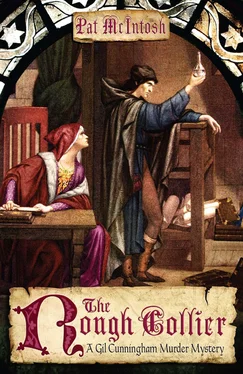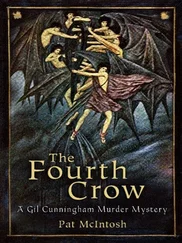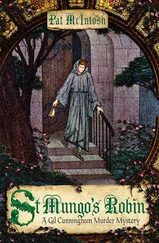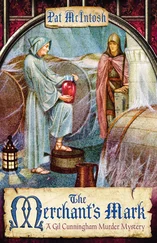Pat McIntosh - The Rough Collier
Здесь есть возможность читать онлайн «Pat McIntosh - The Rough Collier» весь текст электронной книги совершенно бесплатно (целиком полную версию без сокращений). В некоторых случаях можно слушать аудио, скачать через торрент в формате fb2 и присутствует краткое содержание. Жанр: Исторический детектив, на английском языке. Описание произведения, (предисловие) а так же отзывы посетителей доступны на портале библиотеки ЛибКат.
- Название:The Rough Collier
- Автор:
- Жанр:
- Год:неизвестен
- ISBN:нет данных
- Рейтинг книги:4 / 5. Голосов: 1
-
Избранное:Добавить в избранное
- Отзывы:
-
Ваша оценка:
- 80
- 1
- 2
- 3
- 4
- 5
The Rough Collier: краткое содержание, описание и аннотация
Предлагаем к чтению аннотацию, описание, краткое содержание или предисловие (зависит от того, что написал сам автор книги «The Rough Collier»). Если вы не нашли необходимую информацию о книге — напишите в комментариях, мы постараемся отыскать её.
The Rough Collier — читать онлайн бесплатно полную книгу (весь текст) целиком
Ниже представлен текст книги, разбитый по страницам. Система сохранения места последней прочитанной страницы, позволяет с удобством читать онлайн бесплатно книгу «The Rough Collier», без необходимости каждый раз заново искать на чём Вы остановились. Поставьте закладку, и сможете в любой момент перейти на страницу, на которой закончили чтение.
Интервал:
Закладка:
‘Did he?’ said Gil, in what he hoped was a sympathetic tone.
‘Indeed he did, and here’s my laddie with tales of how his teachers admire his every word. And the man canny even find me a decent relic for this kirk, to keep the colliers and their women here instead of trailing down into Carluke or Lanark wi’ their petitions.’
And how should they bring their prayers here if it’s kept locked? Gil wondered, and looked about him. The little space held only the furnished altar, an aumbry on legs for the Mass-vessels, and three benches round the walls. The altar-linen must be shut in the aumbry, and a shelf below the closed portion held an obvious candle-box, its corners gnawed by hopeful rats. A pewter holy-water stoup hung from a nail by the door. Linked ideas made him glance downward, to find the floor made of neatly fitted slabs of grey-blue stone much like Bel’s slate, which was still in his purse. No hope of returning that just now, he thought; I can hardly hand it to Arbella with that inscription, and get the lassie into trouble.
‘You keep the key?’ he asked.
‘I have all the keys, maister,’ said Arbella simply. ‘There’s another lives on a nail by the kitchen door,’ she added. ‘We keep it locked because there’s no priest here, but our folk can aye get in if they wish.’
Beyond Linlithgow, the way out to Blackness was a well-made and well-used road, with heaps of stones at intervals to fill in potholes.
‘Likely the merchants that use the port keep it up,’ said Gil when Patey commented. ‘Or it’s paid out of the port dues. There’s only the one way up from the shore.’
‘And is it the shore we’re making for, maister?’ said Patey. His chastened mood had not lasted long, and Gil had become resigned to the man’s chatter. ‘Did you say you wanted the salt-boilers? I suppose that would be them yonder where the smoke is.’
‘More than likely,’ Gil agreed, eyeing the dark column leaning downwind from the distant point, across the bay from the square outline of the castle. ‘Since it seems they burn coal. I wonder what it’s like in the castle when the wind’s in the west?’
They rode down off the low hills which separated Linlithgow from the Forth, through the settlement of Blackness itself where the smells of supper drifted on the wind, and on to the shore. Two merchant vessels were drawn up on the shingle, one loading, one unloading, and another lay at anchor out in the bay. Round the three legs of the crane a stack of barrels waited to be swung on board, several men were handling bales of wool out of a barn, and a handful of carts stood by, the carters shouting directions to the shore porters about their loads. The custumar in a long belted gown of black trimmed with squirrel bustled importantly through the activity, followed by his clerk with ink-pot and parchment at the ready.
‘Where do we lie tonight, Maister Gil?’ asked Patey, assessing the distance out to the tower of smoke.
‘Tonight? I hadn’t thought,’ Gil confessed.
‘Aye, I thought not,’ said Patey with a faint resentment, turning to look back at the way they had come. ‘Just if we’re to go back to Linlithgow to seek a bed, we’ll no need to be held up here. The light willny last, ye ken, and it’s turned cloudy again, we’ll ha’ no good of the moon.’
Accosting the custumar got them the information that there were two inns in Blackness, but they didny want to patronize the Blue Bell where all the common mariners lay, they would do better to ask at the Ship.
‘Or you might get a bed at the castle,’ offered the functionary, studying Gil’s horse and clothing, setting it against his lack of a retinue and obviously coming down on the side of his being likely kin or acquaintance of Ross of Hawkhead who held the castle for the Crown.
‘We’ll try the Ship first,’ Gil decided, at which Patey brightened noticeably
Leaving the horses safely stabled and his man sampling the ale in the inn’s public room, Gil walked on along the curving shore and out towards the point on the western side of the bay. The scene round the saltpans came into view as he approached, a chaos of heaps of coal, heaps of ash, wooden sheds with baskets of salt visible in their shelter. The wide pans of rust-coated iron stood in a row under a long thatched roof, the red glow of the fires beneath them, with dark figures moving to and fro in the drifting smoke and steam. Seagulls swirled screaming over their heads. It made Gil think of a vision of hell by that mad Flemish painter Bosch. Almost he expected to encounter half a dozen devils with lolling tongues and extra faces, prodding a fat bishop into the boiling sea-water.
Instead, he found two weather-beaten men and a woman, armed with bleached wooden rakes and long scoops, trudging back and forward along the pans of bubbling white liquor, plying first rake and then scoop in each. Gulls swooped and mewed and pounced on what was spooned out of the pans and there was a tang of rotting fish in the smoke.
‘Aye, you get a’ things in the pans,’ agreed the eldest salt-boiler, a gnarled man with one red-rimmed eye, leaning on his rake. ‘A’ thing but coin,’ he added, and laughed at his own joke. ‘Crabs, o’ course, and whelks and that. A glove or a shoe, often enough.’
‘Never in pairs, but,’ said the woman, who appeared to be his wife. ‘Are they, Wullie?’
‘I found a drowned bairn,’ said the younger man. ‘Din’t I no, Mammy, I found a — ’
‘It wasny a bairn, Jock,’ said his mother repressively ‘The gentleman doesny want to hear about it.’
‘Aye, but it was,’ said Jock. ‘It was a’ green — ’
‘Jock! Get back to the pans!’
‘Can I help you, maister, or was ye just wanting to see the salt-boiling?’ asked the older man. ‘There’s many folk likes to see where their salt comes from. Ye see here,’ he said, without waiting for an answer, ‘we gather the water here wi’ the tide, in yonder tank in the rock, and lift it wi’ the bucket-gang and the auld pony, into the pans. We’ve a great system wi’ sluices to let the water run the length o’ the pans, and then we shut it off and set the fires.’
‘Two days, it takes, to come through the boil, doesn’t it no, Wullie?’ said his wife. ‘These was the first pans on the Forth to have sluices,’ she added proudly. ‘Ye’re looking at the best salt-pans in the Lothians, maister.’
‘I never knew there was so much involved,’ confessed Gil, looking round him. ‘Do you live down here on the shore? Is that your house?’
‘That? That’s no but a shelter for when the weather’s bad. We dwell up yonder.’ Wullie pointed to a cottage crouched some yards back from the shore. His wife turned back to the pans, and he continued to show Gil the process with a fluency which made it clear he was used to visitors. Gil heard him out, fascinated and appalled, peered into the shed at the straw skeps of dry salt waiting to be sold on, learned about creech and bittern and the use of bullocks’ blood to clarify the brine. ‘Swine’s blood’s no good,’ the man informed him, leaning on his rake, ‘the reason being, swine’s flesh has a natural affinity with salt, ye see, so the blood takes up the salt out the brine instead of drawing up the lees. Or so Peter Nicholson our clerk tells me. Ye need to let the blood stand till it turns rotten, o’ course, it’s no use when it’s fresh.’
‘Of course,’ echoed Gil, wondering if he could ever put salt on his food again.
‘I’ve heard there’s salt-pans at Ayr,’ conceded Wullie, ‘but the best sea salt comes from the shores of the Forth, maister, mind that. The coal’s handy, the sea-water’s good, and we get rock salt in from the Low Countries to strengthen the brine.’
Читать дальшеИнтервал:
Закладка:
Похожие книги на «The Rough Collier»
Представляем Вашему вниманию похожие книги на «The Rough Collier» списком для выбора. Мы отобрали схожую по названию и смыслу литературу в надежде предоставить читателям больше вариантов отыскать новые, интересные, ещё непрочитанные произведения.
Обсуждение, отзывы о книге «The Rough Collier» и просто собственные мнения читателей. Оставьте ваши комментарии, напишите, что Вы думаете о произведении, его смысле или главных героях. Укажите что конкретно понравилось, а что нет, и почему Вы так считаете.












